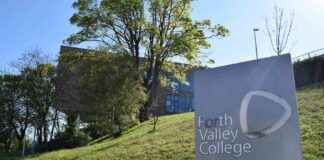The start of the term at Forth Valley College is expected to face disruptions as lecturers are set to take part in additional industrial action. An emergency committee meeting of the Educational Institute of Scotland (EIS) has announced six days of strikes as part of an ongoing pay dispute.
Lecturers from colleges across Scotland will go on strike from Tuesday, August 20, to Thursday, August 22. This will be followed by more strike days from Tuesday, August 27, to Thursday, August 29, and Friday, August 30. The EIS-FELA president, Anne-Marie Harley, explained that the dispute is about fair pay and job security for lecturing staff who have not received a cost of living pay increase since 2021.
The offer on the table from College Employers Scotland (CES) falls short of what other sectors have received during the cost of living crisis. Despite attempts to negotiate with CES, EIS-FELA has not received any new offers. The decision to strike was not one that lecturers wanted, but they felt compelled to do so due to the lack of progress in negotiations.
In June, Forth Valley College lecturers staged a strike to protest outside the Alloa campus. They expressed concerns that a pay rise could lead to job cuts, something EIS-FELA is trying to avoid. CES, responsible for setting lecturer pay in Scotland, has maintained that their offer is final.
Gavin Donoghue, director of College Employers Scotland, emphasized that the proposed pay award would make Scotland’s college lecturers the best-paid in the UK. He urged EIS-FELA to reconsider the strikes, as further disruptions could harm students’ learning experience.
Forth Valley College’s principal, Kenny MacInnes, expressed disappointment with the planned strikes, especially considering the impact on students starting or returning to college. The college aims to minimize the disruption to learning and teaching despite the industrial action.
In addition to full strike days, EIS-FELA members have been engaging in Action Short of Strike (ASOS), which involves working but refusing to perform certain tasks, such as grading students’ work. Mr. MacInnes acknowledged the challenges posed by the situation and encouraged students to seek support if needed.
While hoping for a swift resolution, the college will continue to update students, staff, and partners on any developments. The priority remains to ensure that the start of the academic year is as smooth as possible for everyone involved.



















